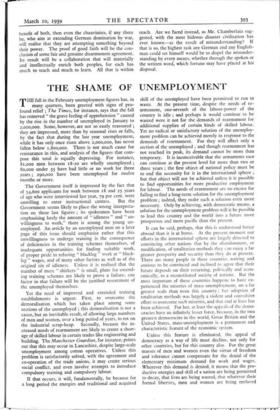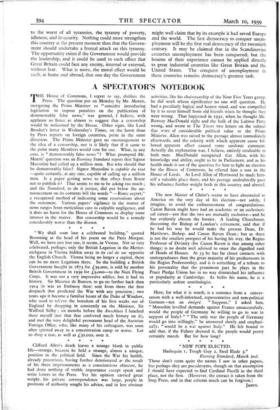THE SHAME OF UNEMPLOYMENT
THE fall in the February unemployment figures has, in many quarters, been greeted with signs of pro- found relief ; The Times, for instance, says that the fall has removed" the grave feeling of apprehension" caused by the rise in the number of unemployed in January to 2,000,000. Some, however, are not so easily reassured ; they are impressed, more than by seasonal rises or falls, by the fact that during the last year unemployment, while it has only once risen above 2,000,000, has never fallen below 1,800,000. There is not much cause for reassurance in this, and analysis of the figures that com- pose this total is equally depressing. For instance, 81,000 men between 18-20 are wholly unemployed ; 8o,000 under 35 have had little or no work for three years ; 290,000 have been unemployed for twelve months or more.
The Government itself is impressed by the fact that of 54,600 applicants for work between 18 and 25 years of age who were interviewed last year, 79 per cent. were unwilling to enter instructional centres. But the Government seems likely to place the wrong interpreta- tion on these last figures ; its spokesmen have been emphasising lately the amount of " idleness " and "un- willingness to work," there is among the young un- employed. An article by an unemployed man on a later page of this issue should emphasise rather that this unwillingness to undergo training is the consequence of deficiencies in the training schemes themselves, of inadequate opportunities for finding suitable work, of proper pride in refusing " blackleg " work at " black- leg " wages, and of many other factors as well as of the original sin of idleness. Unless it is realised that the number of mere " shirkers " is small, plans for extend- ing training schemes are likely to prove a failure; one factor in that failure will be the justified resentment of the unemployed themselves.
Yet the need of improved and extended training establishments is urgent. First, to overcome the demoralisation which has taken place among some sections of the unemployed ; this demoralisation is not a cause, but an inevitable result, of allowing large numbers of men and women, over a long period of years, to rot on the industrial scrap-heap. Secondly, because the in- creased needs of rearmament are likely to create a short- age of skilled labour in certain trades like engineering and building. The Manchester Guardian, for instance, points out that this may occur in Lancashire, despite large-scale unemployment among cotton operatives. Unless this problem is satisfactorily solved, with the agreement and co-operation of the trade unions, it may create serious social conflict, and even involve attempts to introduce compulsory training and compulsory labour.
If that occurs, it will, fundamentally, be because for a long period the energies and traditional and acquired skill of the unemployed have been permitted to run to waste. At the present time, despite the needs of re- armament, one-seventh of the labour-power of the country is idle ; and perhaps it would continue to be wasted were it not for the demands of rearmament for additional supplies of certain kinds of skilled labour. Yet no radical or satisfactory solution of the unemploy- ment problem can be achieved merely in response to the demands of rearmament. For they will affect only a section of the unemployed ; and though rearmament has not reached its peak, its demand cannot be more than temporary. It is inconceivable that the armaments race can continue at the present level for more than two or three years ; the first object of national policy must be to end the necessity for it in the international sphere ; but that object will not be achieved unless it is possible to find opportunities for more productive employment for labour. The needs of rearmament are no excuse for failing to find a long-term solution for the unemployment problem ; indeed, they make such a solution even more necessary. Only by achieving, with democratic means, a solution for the unemployment problem will it be possible to lead this country and the world into a future more prosperous and more pacific than the present.
It can be said, perhaps, that this is understood better abroad than it is at home. At the present moment our efforts in the international sphere are largely directed to convincing other nations that by the abandonment, or modification, of totalitarian methods they can enjoy a far greater prosperity and security than they do at present. There are many people in these countries waiting and anxious to be convinced and inclined to agree that their future depends on their returning, politically and econ- omically, to a reconstituted society of nations. But the most important of these countries happens to have ex- perienced the miseries of mass unemployment, on a far greater scale than even this country ; her adoption of totalitarian methods was largely a violent and convulsive effort to overcome such miseries, and that end at least has been achieved. For her, at least the appeals of the demo- cracies have an infinitely lesser force, because, in the two greatest democracies in the world, Great Britain and the United States, mass-unemployment is a permanent and characteristic feature of the economic system.
Unless this feature is eliminated, the appeal of democracy as a way of life must decline, not only for other countries, but for this country also. For the great masses of men and women even the virtue of freedom and tolerance cannot compensate for the denial of the elementary minimum demand for work and wages. Wherever this demand is denied, it means that the pro- ductive energies and skill of a nation are being permitted to decay, that lives are being wasted, that whatever their formal liberties, men and women are being enslaved to the worst of all tyrannies, the tyranny of poverty, idleness, and insecurity. Nothing could more strengthen this country at the present moment than that the Govern- ment should undertake a frontal attack on this tyranny. The opportunity exists if the Government would provide the leadership, and it could be used to such effect that Great Britain could face any enemy, internal or external, without fear. What is more, the moral effect would be such, at home and abroad, that one day the Government might well claim that by its example it had saved Europe and the world. The first democracy to conquer unem- ployment will be the first real democracy of the twentieth century. It may be claimed that in the Scandinavian countries unemployment has been conquered; but the lessons of their experience cannot be applied directly to great industrial countries like Great Britain and the United States. The conquest of unemployment in these countries remains democracy's greatest task.











































 Previous page
Previous page